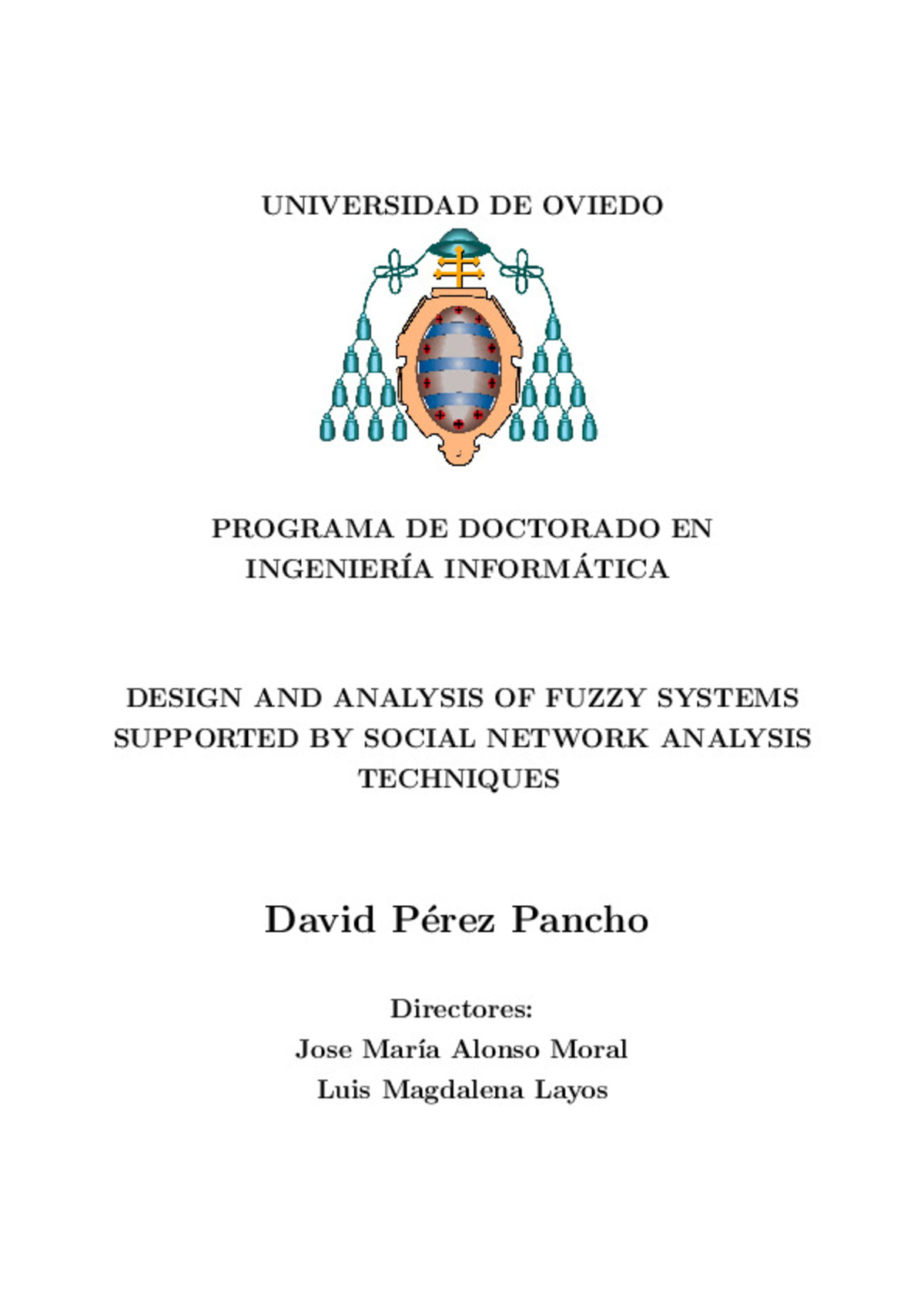Design and analysis of fuzzy systems supported by social network analysis techniques
Otros títulos:
Diseño y análisis de técnicas fuzzy apoyados en técnicas de análisis de redes sociales
Autor(es) y otros:
Director(es):
Centro/Departamento/Otros:
Palabra(s) clave:
Ingeniería informática
Inteligencia artificial
Fecha de publicación:
Descripción física:
Resumen:
This doctoral dissertation proposes the creation and development of a new methodology for fuzzy system comprehensibility analysis based on fuzzy systems' inference maps, so-called fuzzy inference-grams, Fingrams in short. Fingrams show graphically fuzzy rule-based systems, presenting the interaction between rules at the inference level in terms of co-fired rules, i.e., rules fired at the same time by a given input. Even more, Fingrams are likely to act as an effective and efficient tool in several applications regarding both design and refinement of fuzzy systems. The human centric improvement of a fuzzy rule-based system could be done after analyzing the resulting graphs manually or assisted by well-known social network analysis techniques (such as community mining) and quality indexes (such as centrality, page rank and so on). The analysis of Fingrams offers many possibilities: measuring the comprehensibility of fuzzy systems, detecting redundancies and/or inconsistencies among fuzzy rules, finding out and analyzing instances not covered, identifying the most significant rules, and so forth. The new methodology has been tested and validated for fuzzy association rules, fuzzy rule-based classifiers and regressors. The utility of Fingrams over fuzzy association rules was illustrated in a real-world problem dealing with qualitative assessment of industrial objects designed through cognitive engineering. FURIA algorithm was used over a real dataset to show the possibilities of Fingrams in fuzzy rule-based classifiers. And, we selected an electrical network distribution problem to present the potential of Fingrams in the context of fuzzy rule-based regressors. Finally, it is worthy to note that Fingrams are fully integrated in different software tools thanks to the specific software implemented during the thesis period. The fuzzy modeling toolbox GUAJE, and the software suites for data mining KEEL and KNIME have been enhanced allowing the creation and analysis of Fingrams.
This doctoral dissertation proposes the creation and development of a new methodology for fuzzy system comprehensibility analysis based on fuzzy systems' inference maps, so-called fuzzy inference-grams, Fingrams in short. Fingrams show graphically fuzzy rule-based systems, presenting the interaction between rules at the inference level in terms of co-fired rules, i.e., rules fired at the same time by a given input. Even more, Fingrams are likely to act as an effective and efficient tool in several applications regarding both design and refinement of fuzzy systems. The human centric improvement of a fuzzy rule-based system could be done after analyzing the resulting graphs manually or assisted by well-known social network analysis techniques (such as community mining) and quality indexes (such as centrality, page rank and so on). The analysis of Fingrams offers many possibilities: measuring the comprehensibility of fuzzy systems, detecting redundancies and/or inconsistencies among fuzzy rules, finding out and analyzing instances not covered, identifying the most significant rules, and so forth. The new methodology has been tested and validated for fuzzy association rules, fuzzy rule-based classifiers and regressors. The utility of Fingrams over fuzzy association rules was illustrated in a real-world problem dealing with qualitative assessment of industrial objects designed through cognitive engineering. FURIA algorithm was used over a real dataset to show the possibilities of Fingrams in fuzzy rule-based classifiers. And, we selected an electrical network distribution problem to present the potential of Fingrams in the context of fuzzy rule-based regressors. Finally, it is worthy to note that Fingrams are fully integrated in different software tools thanks to the specific software implemented during the thesis period. The fuzzy modeling toolbox GUAJE, and the software suites for data mining KEEL and KNIME have been enhanced allowing the creation and analysis of Fingrams.
Descripción:
Tesis con mención internacional. Tesis doctoral por el sistema de compendio de publicaciones
Notas Locales:
DT(SE) 2015-299
Colecciones
- Tesis [7677]
- Tesis doctorales a texto completo [2172]
Ficheros en el ítem





